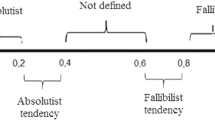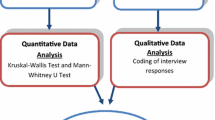Abstract
The purpose of this study was to explore the views of students enrolled at a small United States Midwestern community college toward learning mathematics, and to examine the relationship between student beliefs about mathematic learning and educational experiences with mathematics using Q methodology and open-ended response prompts. Schommer’s (Journal of Educational Psychology, 82, 495–504, 1990) multidimensional theory of personal epistemology provided the structural framework for the development of 36 domain specific Q sort statements. Analysis of the data revealed three distinct but related views of learning mathematic which were labeled Active Learners, Skeptical Learners, and Confident Learners. Chi-square tests of independence revealed no significant differences based on gender. Additionally, there was no evidence for differences based on level of mathematics completed, age, or college hours accumulated. Student’s previous experiences in instructional environments, however, were closely associated with beliefs. Results are discussed in view of the implications for establishing learning environments and considerations in implementing Standards-based curricula in higher education.



Similar content being viewed by others
References
Anderman, E. M., & Young, A. J. (1994). Motivation and strategy use in science: Individual differences and classroom effects. Journal of Research in Science Teaching, 31, 811–831. doi:10.1002/tea.3660310805.
Baxter Magolda, M. B. (2004). Evolution of a constructivist conceptualization of epistemological reflection. Educational Psychologist, 39, 31–42. doi:10.1207/s15326985ep3901_4.
Belenky, M., Clinchy, B. M., Goldberger, N., & Tarule, J. (1986). Women’s ways of knowing: The development of self, voice, and mind. New York: Basic Books.
Brown, S. R. (1980). Political subjectivity: Applications of Q methodology in political science. New Haven: Yale University Press.
Brownlee, J., & Berthelsen, D. (2008). Developing relational epistemology through relational pedagogy: New ways of thinking about personal epistemology in teacher education. In M. S. Khine (Ed.), Knowing, knowledge and beliefs: Epistemological studies (pp. 405–422). New York: Springer.
Buehl, M. M., Alexander, P. A., & Murphy, P. K. (2002). Beliefs about schooled knowledge: Domain specific or domain general? Contemporary Educational Psychology, 27, 415–449. doi:10.1006/ceps.2001.1103.
Carter, G., & Norwood, K. S. (1997). The relationship between teacher and student beliefs about mathematics. School Science and Mathematics, 97, 62–67.
Dweck, C. S. (2000). Self-theories: Their role in motivation, personality, and development. Philadelphia, PA: Psychology Press.
Dweck, C. S., & Leggett, E. L. (1988). A social-cognitive approach to motivation and personality. Psychological Review, 95, 256–273. doi:10.1037/0033-295X.95.2.256.
Fiore, G. (1999). Math-abused students: Are we prepared to teach them? Mathematics Teacher, 92, 403–407.
Frank, M. L. (1988). Problem solving and mathematical beliefs. The Arithmetic Teacher, 35, 32–34.
Franke, M. L., & Carey, D. A. (1997). Young children’s perceptions of mathematics in problem-solving environments. Journal for Research in Mathematics Education, 28, 8–25. doi:10.2307/749661.
Goldsmith, L. T., & Mark, J. (1999). What is a standards-based mathematics curriculum? Educational Leadership, 57(3), 40–44.
Hofer, B. K. (1999). Instructional context in the college mathematics classroom: Epistemological beliefs and student motivation. Journal of Staff, Program, and Organizational Development, 16, 73–82.
Hofer, B. K. (2000). Dimensionality and disciplinary differences in personal epistemology. Contemporary Educational Psychology, 25, 378–405. doi:10.1006/ceps.1999.1026.
Hofer, B. K., & Pintrich, P. R. (1997). The development of epistemological theories: Beliefs about knowledge and knowing and their relation to learning. Review of Educational Research, 67, 88–140.
Jackson, C. D., & Leffingwell, R. J. (1999). The role of instructors in creating math anxiety in students from kindergarten through college. Mathematics Teacher, 92, 583–587.
Jehng, J. J., Johnson, S. D., & Anderson, R. C. (1993). Schooling and students’ epistemological beliefs about learning. Contemporary Educational Psychology, 18, 23–35. doi:10.1006/ceps.1993.1004.
King, P. M., & Kitchener, K. S. (2004). Reflective judgment: Theory and research on the development of epistemic assumptions through adulthood. Educational Psychologist, 39, 5–18. doi:10.1207/s15326985ep3901_2.
Kloosterman, P. (2002). Beliefs about mathematics and mathematics learning in the secondary school: Measurement and implications for motivation. In G. C. Leder, E. Pehkonen, & G. Torner (Eds.), Beliefs: A hidden variable in mathematics education? (pp. 13–37). Norwell, MA: Kluwer.
Kuhn, D. (2001). How do people know? Psychological Science, 12, 1–8. doi:10.1111/1467-9280.00302.
Lerch, C. M. (2004). Control decisions and personal beliefs: Their effect on solving mathematical problems. The Journal of Mathematical Behavior, 23, 21–36. doi:10.1016/j.jmathb.2003.12.002.
Lubienski, S. T. (2004). Traditional or standards-based mathematics? The choices of students and parents in one district. Journal of Curriculum and Supervision, 19, 338–365.
McKeown, B., & Thomas, D. (1988). Q methodology. Beverly Hills, CA: Sage.
McLeod, D. B. (1994). Research on affect and mathematics learning in the JRME: 1970 to the present. Journal for Research in Mathematics Education, 25, 637–647. doi:10.2307/749576.
Meece, J. L., Blumefeld, P. C., & Hoyle, R. H. (1988). Students’ goal orientations and cognitive engagement in classroom activities. Journal of Educational Psychology, 80, 514–523. doi:10.1037/0022-0663.80.4.514.
Midgley, C., Kaplan, A., Middleton, M., Maehr, M. L., Urdan, T., Anderman, L. H., et al. (1998). The development and validation of scales assessing students’ achievement goal orientations. Contemporary Educational Psychology, 23, 113–131. doi:10.1006/ceps.1998.0965.
Mtetwa, D., & Garofalo, J. (1989). Beliefs about mathematics: An overlooked aspect of student difficulties. Academic Therapy, 24, 611–618.
Muis, K. R. (2004). Personal epistemology and mathematics: A critical review and synthesis of research. Review of Educational Research, 74, 317–377. doi:10.3102/00346543074003317.
National Council of Teachers of Mathematics (2000). Principles and standards for school mathematics. Reston, VA: National Council of Teachers of Mathematics.
Norwood, K. S. (1994). The effect of instructional approach on mathematics anxiety and achievement. School Science and Achievement, 94, 248–255.
Olafson, L., & Schraw, G. (2006). Teachers’ beliefs and practices within and across domains. International Journal of Educational Research, 45, 71–84. doi:10.1016/j.ijer.2006.08.005.
Op’T Eynde, P., De Corte, E., & Verschaffel, L. (2002). Framing students’ mathematics-related beliefs. In G. Leder, E. Pehkonen, & G. Torner (Eds.), Beliefs: A hidden variable in mathematics education? (pp. 13–37). Norwell, MA: Kluwer.
Op’T Eynde, P., De Corte, E., & Verschaffel, L. (2006). Epistemic dimensions of students’ mathematics-related belief systems. International Journal of Educational Research, 45, 57–70. doi:10.1016/j.ijer.2006.08.004.
Perry Jr., W. G. (1970). Forms of intellectual and ethical development in the college years: A scheme. New York: Holt, Rinehart & Winston.
Prichard, G. R. (1995). The NCTM standards and community colleges: Opportunities and challenges. Community College Review, 23, 23–33. doi:10.1177/009155219502300104.
Qian, G., & Alvermann, D. (1995). Role of epistemological beliefs and learned helplessness in secondary school students’ learning science concepts from text. Journal of Educational Psychology, 87, 282–292. doi:10.1037/0022-0663.87.2.282.
Quilter, D., & Harper, E. (1988). Why we didn’t like mathematics, and why we can’t do it. Educational Research, 30, 121–134. doi:10.1080/0013188880300206.
Riordan, J. E., & Noyce, P. E. (2001). The impact of two standards-based mathematics curricula on student achievement in Massachusetts. Journal for Research in Mathematics Education, 32, 368–391. doi:10.2307/749700.
Ruthven, K., & Coe, R. (1994). A structural analysis of students’ epistemic views. Educational Studies in Mathematics, 27, 101–109. doi:10.1007/BF01284530.
Schoenfeld, A. H. (1988). When good teaching leads to bad results: The disasters of “well-taught” mathematics courses. Educational Psychologist, 23, 145–166. doi:10.1207/s15326985ep2302_5.
Schoenfeld, A. H. (1989). Explorations of students’ mathematical beliefs and behavior. Journal for Research in Mathematics Education, 20, 338–355. doi:10.2307/749440.
Schoenfeld, A. H. (2004). The math wars. Educational Policy, 18, 253–286. doi:10.1177/0895904803260042.
Schommer, M. (1990). Effects of beliefs about the nature of knowledge on comprehension. Journal of Educational Psychology, 82, 498–504. doi:10.1037/0022-0663.82.3.498.
Schommer, M. (1993). Epistemological development and academic performance among secondary students. Journal of Educational Psychology, 85, 406–411. doi:10.1037/0022-0663.85.3.406.
Schommer, M. (1998). The influence of age and education on epistemological beliefs. The British Journal of Educational Psychology, 68, 551–562.
Schommer-Aikins, M. (2002). An evolving theoretical framework for an epistemological belief system. In B. K. Hofer, & P. R. Pintrich (Eds.), Personal epistemology: The psychology of beliefs about knowledge and knowing (pp. 103–118). Mahwah, NJ: Erlbaum.
Schommer-Aikins, M. (2008). Applying the theory of an epistemological belief system to the investigation of students’ and professors’ mathematical beliefs. In M. S. Khine (Ed.), Knowing, knowledge and beliefs: Epistemological studies (pp. 303–323). New York: Springer.
Schommer-Aikins, M., Duell, O. K., & Hutter, R. (2005). Epistemological beliefs, mathematical problem-solving beliefs, and academic performance of middle school students. The Elementary School Journal, 105, 289–304. doi:10.1086/428745.
Schommer, M., Crouse, A., & Rhodes, N. (1992). Epistemological beliefs and mathematical text comprehension: Believing it is simple does not make it so. Journal of Educational Psychology, 84, 435–443. doi:10.1037/0022-0663.84.4.435.
Schommer, M., & Walker, K. (1995). Are epistemological beliefs similar across domains? Journal of Educational Psychology, 87, 424–432. doi:10.1037/0022-0663.87.3.424.
Schraw, G., Bendixen, L. D., & Dunkle, M. E. (2002). Development and validation of the epistemic belief inventory (EBI). In B. K. Hofer, & P. R. Pintrich (Eds.), Personal epistemology: The psychology of beliefs about knowledge and knowing (pp. 261–276). Mahwah, NJ: Erlbaum.
Senk, S., & Thompson, D. (Eds.). (2003). Standards-oriented school mathematics curricula: What does the research say about student outcomes? Mahwah, NJ: Erlbaum.
Shavelson, R. J. (1996). Statistical reasoning for the behavioral sciences. Needham Heights, MA: Allyn & Bacon.
Stodolsky, S. S., Salk, S., & Glaessner, B. (1991). Student views about learning math and social studies. American Educational Research Journal, 28, 89–116.
Twigg, C. A. (2005). Increasing success for underserved students: Redesigning introductory courses. Saratoga Springs, NY: National Center for Academic Transformation.
Windschitle, M., & Andre, T. (1998). Using computer simulations to enhance conceptual change: The roles of constructivist instruction and student epistemological beliefs. Journal of Research in Science Teaching, 35, 145–160. doi:10.1002/(SICI)1098-2736(199802)35:2<145::AID-TEA5>3.0.CO;2-S.
Wolters, C. A. (2004). Advancing achievement goal theory: Using goal structures and goal orientations to predict students’ motivation, cognition, and achievement. Journal of Educational Psychology, 96, 236–250. doi:10.1037/0022-0663.96.2.236.
Wood, P., & Kardash, C. (2002). Critical elements in the design and analysis of studies of epistemology. In B. K. Hofer, & P. R. Pintrich (Eds.),Personal epistemology: The psychology of beliefs about knowledge and knowing (pp. 231–260). Mahwah, NJ: Erlbaum.
Author information
Authors and Affiliations
Corresponding author
Rights and permissions
About this article
Cite this article
Wheeler, D.L., Montgomery, D. Community college students’ views on learning mathematics in terms of their epistemological beliefs: a Q method study. Educ Stud Math 72, 289–306 (2009). https://doi.org/10.1007/s10649-009-9192-2
Received:
Accepted:
Published:
Issue Date:
DOI: https://doi.org/10.1007/s10649-009-9192-2




